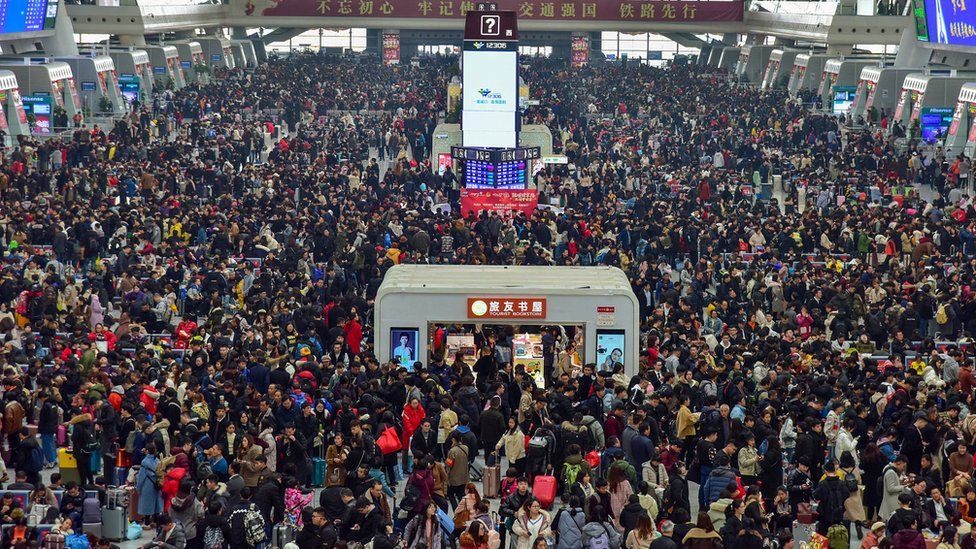Chinese New Year: Clamping down on going home for the holidays
Today marks the start of the world's largest human migration - an event which sees millions of people travel thousands of miles across China to reach home in time for the Lunar New Year.
For some, it is the only time they will see their families all year and is an event not to be missed.
But there are fears the Spring Festival travel season, or Chunyun in Chinese, could become a superspreader event. After all, last year's Chunyun is believed to have played a significant role in the spread of Covid-19.
So the Chinese authorities have been left with a problem: how do you encourage people to stay local, without actually cancelling the country's biggest annual celebration?
The stick
This year's Chunyun begins on 28 January and will last until 8 March, giving people time to travel potentially thousands of miles across China in time for New Year, on 12 February, and back again.
In a normal year, China sees around three billion trips during the Chunyun period.
But last year, as the virus began to gain momentum and the government introduced travel restrictions, figures from the Ministry of Transport show the number of trips fell by more than half.
This year, with life almost back to normal across large swathes of the country, the number of trips made is expected to increase to 1.7bn, officials said.
In preparation for this, Beijing unveiled plans to vaccinate 50m people - or 3.5% of the population - before travel began in earnest.
For people in the affected cities, the message is clear - there will be no travelling for the Spring Festival this year.
But even if your area is not under such a strict lockdown, it might be hard to get home.
China's National Health Commission has stated that people returning to rural areas will need to produce a negative Covid-19 test issued up to seven days before their departure during the Spring Festival.
They'll also have to be under a 14-day "home observation" period - which still allows them to leave their home, but requires them to monitor their temperature daily.
During this time they will also not be allowed to take part in gatherings and have to take a Covid test every seven days.
Many on social media have been quick to point out that this will disproportionately affect migrant workers who work in cities and travel back to their homes in rural areas at this time. The measures would make it either too impractical or too costly - but officials say these are the precautions which need to be taken to keep China safe.
PHD student Huang Jie - which is not his real name - had to show a nucleic acid test result, his "health code" had to be green, and a community acceptance certificate - which he had to have signed by his village's leaders - when he arrived at the station on his way home.
But it was worth it.
"New Year's Eve is a time of reunion," he told the BBC. "I must celebrate it with people I love, I must have someone to spend it with."
The carrot
But what about the majority of those that are not in lockdown, or in high risk areas? The method is quite different.
Take the city of Hangzhou, which is giving out 1,000 yuan (£113; $154) to migrant workers who chose to stay. Companies in Zhejiang, Ningbo and Quanzhou are also issuing these "red packets" for workers choosing not to go home.
Companies have also been encouraged to offer their workers subsidies, free food and to arrange short cultural tours in a bid to get them to stay in.
Then there are the cities where migrant workers who stay over the holidays are been giving extra privileges usually reserved for those born locally, which can be used towards housing and medical care.
https://www.bbc.com/news/world-asia-china-55791858





Post a Comment